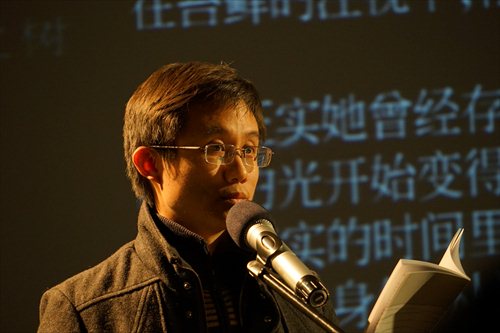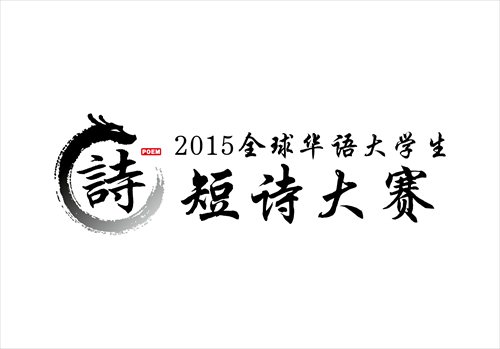HOME >> METRO SHANGHAI
Contest sparks revival of national enthusiasm for poetry
By Du Qiongfang Source:Global Times Published: 2016-3-20 18:43:01

Qin Sanshu reads poetry. Photo: Courtesy of Qin Sanshu
Chinese poetry can be dated back to the 11th century BC and was once the most popular literary form. As well as the great classical poets, like Li Bai (701-762) and Du Fu (712-770), Chinese emperors, generals and political leaders like Li Yu (937-978), Cao Cao (155-220) and Mao Zedong (1893-1976) also wrote poetry.
Nowadays the spread of the Internet and new technology has made it easier than ever before for poets to disseminate their words and to find appreciative audiences. On university campuses in China young poets are keeping the form alive.
Over the past few months the Shanghai Jiao Tong University has been running its Global Chinese Poetry Contest which has attracted entries from some 23,000 Chinese students and graduates studying at home and abroad at 1,560 colleges and universities throughout the world. After a series of elimination rounds and finals 108 prizewinners were announced recently - they shared 200,000 yuan ($30,908) in prize money.
A part of life
Qin Sanshu collected a second prize in the contemporary poetry section of the contest. He is a third year graduate of comparative literature in the Chinese department at Fudan University and has won awards for his poetry before. As a student of literature poetry is part of Qin's everyday life.
"I find inspiration every day. When I woke up this morning and before we talked (to the Global Times) I was inspired, trying to imagine your voice. When we finish talking I might be inspired again, because the reality of hearing you will echo with my earlier imagination. As I talk to you on the phone I am looking out over the balcony at some cherry blossom trees with buds and listening to birds in the background. This is an interesting scene and it could be a real inspiration," Qin said. Although he finds inspirations constantly not all of these become poems - he selects those moments carefully.
Poetry is a lot more than inspiration. The practical side of writing requires discipline and patience and constant rewriting. "Poetry is a work of art. You might feel a poem has a deep meaning or is really inspired. But the creative process is loaded with difficulties and I have to spend a lot of time polishing my words. I need long periods when I just concentrate, read and feel," Qin said. Although many of his poems seem to be relaxed and flow easily, his readers are unaware of the hard work behind them.
"You can feel subtlety in poetry but never think that this was just created instantaneously. If a poem can be read easily and smoothly and does not appear to be at all difficult this is a tribute to your proficiency," he said.
One of the judges of the preliminary rounds of the poetry contest was Yang Biwei, herself a poet and a PhD graduate in modern and contemporary Chinese literature from the Minzu University of China. As a judge she spent up to three hours a day for weeks reading the entries.

The logo of the Shanghai Jiao Tong University's Global Chineze Poetry Contest Photo: Courtesy of the organizer of the Global Chineze Poetry Contest
Aesthetic appreciation
"I think poets born in the 1990s have broadened imaginations and a solid foundation of literary backgrounds as well as excellent aesthetic appreciation. They discover things in their lives that no one else has found. Or they take something abstract from their subconsciousness which we missed," Yang said.
One of the judges for the final rounds of the contest was the noted poet and cultural commentator Ye Kuangzheng and he found the entries were of a much higher standard than in previous years. "One of the important ways we assess a poem is to see if the poet is talking about a unique life experience and if this is expressed in a unique way. Another thing we consider is the use of language. Poetry should express what might be difficult to express in prose, it should be innovative," Ye said.
Ye won many awards for his poetry in the 1980s and 1990s. "For college students born in the 1990s, poetry and other literary forms which used to be the major ways to express inner thoughts are no longer the mainstream forms. Today's young people tend to use images to express themselves. Although the general level of today's young poets is not as good as the poets of the 1980s and 1990s when almost every Chinese major student wrote poetry, I still discovered great talent in this contest," he said.
He thinks the text culture era has moved on to an image culture era in which people receive more information from images. As well, communication apps like WeChat are returning people to the oral communication era, where people are expressing their thoughts with language.
"Before printing technology was invented, people mostly expressed themselves and communicated orally. Poetry was a major literary form in the oral language era. But today people are communicating through WeChat and QQ which bring people back to the oral era. Oral communication needs to be concise and short and it needs to be easy to spread. I think the advancement of technology will benefit the development of poetry," Ye said.
The advancement of poetry also needs poetry readers. But unlike other literary forms, like stories, novels and essays, poetry can be difficult to understand. "A lot of people can't understand poetry because it is trying to express things that are difficult to express in language," Ye said.
Prizewinner Qin Sanshu believes poems describe, narrate or convey a moment or a fragment of reality, and the poet's concerns or understanding. The single moment or fragment doesn't reflect just one specific theme. Even if I have a vague theme in a poem, the understanding readers get from it and my intended meaning can be different," he said.
He also thinks that ordinary people in China have not been taught about contemporary poetry. Although people are taught in school about classical Chinese poetry, Qin would like to see schools and colleges including contemporary poetry in their courses. "There's no proper critical system in China for contemporary poetry. But if people want to find out more about contemporary there are articles that can help them understand more." He said there were also events where poetry was discussed and explained.

Li Jincheng (right) at a poetry contest awards ceremony Photo: Courtesy of Li Jincheng
Education not vital
But Ye thinks education is not vital for a poet. "Sometimes the more education a person gets the harder it is for him to write poetry because education can spoil the way a person feels about the language. Many of China's finest poets had little formal education. But they taught themselves and endowed the language with their own personalities," Ye said.
Shanghai Jiao Tong University has put a lot of effort into promoting Chinese poetry with this contest, which attracted enthusiastic responses from poetry societies at universities all over the country. Ma Renyi was the organizer of the contest and said 346 students from Sichuan University alone took part in the event. "When we received details of the contestants we found many of them were involved with university poetry societies." Ma said many college students and new graduates including himself had been inspired by the contest and began reading and writing poetry themselves again.
Curiously many contestants were not literature majors. Li Jincheng, a junior from Fudan University, won a first prize at the contest but is majoring in computer science. Before he entered this contest, he had won other poetry competition prizes. He began writing poetry in senior high school. Another prizewinner, Shi Xiaojie, is a PhD candidate in the mathematics department at Princeton University. Shi said that Chinese people living abroad often feel that they can only speak Chinese by talking to themselves in a mirror. Like other Chinese living abroad Shi expressed his feelings about homesickness and his hometown in poetry.
Contest judge Ye said poets were a mixed group with different personalities. "Some poets make a big display of their talent, some are in the lower social classes, some are successful businessmen, some are university teachers, some are policemen, some are civil servants. Most poets regard writing as a hobby or interest. Even in the Tang Dynasty (618-907), writing poetry was just a diversion for groups of friends.
Internet advancement
"But the advancement of the Internet has attracted more people to poetry. In the past, poets had to be published in magazines and newspapers. But the Internet allows people interested in poetry to establish groups of interested people easily and they can talk to each other and talk about their poems. When their work is praised by others these poets will keep writing." He believes there are more than 400,000 poetry enthusiasts in China at present.
According to Ma, most of the contestants have been writing poetry for some time. One of the major prizewinners was a young man from Sichuan University who had been writing poetry for years but had never told his parents of his hobby.
The contest also meant that these poems were quite widely read. One of the major winners was Lin Dong, a graduate from the Capital Normal University. He has been writing poetry for years but had never been published - except for his personal blog which had a small readership. Because of the contest, thousands of people have read his poems and he is very grateful.
In the public poll section of the contest a poem written by winner Tuotuobuhua (pseudonym) attracted a lot of attention. Tuotuobuhua is doing a doctorate in Chinese at Peking University and he has been greatly encouraged by the response to his work and the award. Even though he is a Chinese language major, before the contest he had regarded poetry as an unimportant hobby. Now he has a new approach.
Newspaper headline: Well versed students
Posted in: Metro Shanghai, City Panorama